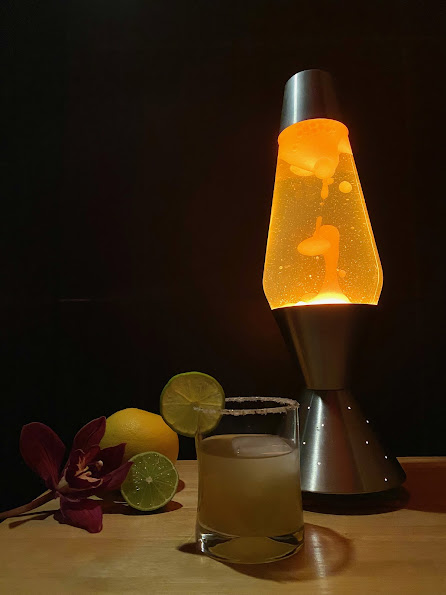Over the next year, what the bridge initially thought would be, at best, a horrifically uncomfortable roommate dynamic, evolves into something much deeper."
Insights and Opinions
Other Important Things
Our Next Book
 |
| What Margy was drinking in secret |
 |
| What Margy was drinking in secret |
 | |
| Treats not allowed on the space station. |
 | ||
| The earthlings |
Set in the world’s largest ocean, this awe-filled book explores that last wild place we have yet to colonize in a still-unfolding oceanic game, and interweaves beautiful writing, rich characterization, profound themes of technology and the environment, and a deep exploration of our shared humanity in a way only Richard Powers can."
Powers' prose is both clean and magical at the same time. He'll give us the simple:
"The island rose like a hatbox floating on the waves."
And then the sublime, as Evie watches a cuttlefish dance:
The dude knows his way around a metaphor.
This is clearly a book that deserves to be read twice. Read it the first time for the prose and the wonder and the surprises. Read it again to find the clues that are all there and then decide for yourself what really happened.
For next month, we have both a reading selection and an assignment.
We will read The Puppets of Spelhorst and The Hotel Balzaar by Kate DiCamillo. These are both books for young readers and are quick reads.
In addition, please come prepared with a list of your three most favorite books of all time. If we have time, we will share our lists with each other. There will be no fighting.
 |
| Special thanks to Steve for serenading us in. |
 |
| The group just before we came to blows. |
 |
| What Jocey did after she left, even though it's late October. |
"And then along comes a chance at “Sverige och Mig” — “Sweden and Me.” In Sweden, the show is known as “Crying Americans,” and with good reason. There is a lot of crying in this book. Paulie “bursts into tears” every few pages, which might make the reader roll their eyes, but which also makes, apparently, good TV.
The show’s producers encourage this behavior, asking questions such as, “Talk about how far you have come since you first arrived in Sweden. … If you cry, that is okay.” And “Talk about what you love about Sweden. … Consider crying as you say this.” And “Talk about your friends who have already left the show … If you cry, that is great!”
Paulie obliges. She cannot help herself. She is an emotional basket case, vulnerable and insecure while also deeply competitive and sometimes mean. (“You have too many feelings,” one of the other competitors tells her.) Her parents — a homophobic closeted gay minister and an alcoholic mother — have left her with a yearning for a traditional, loving family.
Anyone who has traveled alone to an unfamiliar place will understand the heightened state of awareness that Paulie experiences during her five weeks in Sweden. Everything there is so different, so clean, so beautiful! The people are so kind! The producers are so sexy — well, one of them is.
Franson’s writing is smooth, filled with apt metaphors and zingy one-liners. Watching a burly Swedish man cry was like “watching a bear use a fork and knife.” A meek woman’s posture was “as bent as a hanger.” A breeze swept through an open window “like a burst of laughter.”
The book shifts so quickly from one scene to the next that the reader begins to crave a bit of summary — does everything have to be shown? The narrative is so detailed it starts to feel as though the five weeks in Sweden unfurl in real time.
Franson is skilled at mixing slapstick with serious. There are pratfalls and belches, fisticuffs and stolen kisses and so much drinking. Everything is exaggerated. But at the same time, Paulie’s desire for a family connection is deep-seated and moving.
Big in Sweden is funny and mostly satisfying, certain to be big here, and a worthy successor to Franson's A Lady's Guide to Selling Out, which is being developed for Netflix by Meg Ryan."
Because we can't help ourselves, and because we love to read works we can really dig into, we did agree that we would have liked to see the characters more deeply developed. But the humor in this book, and Franson's deft hand at storytelling carried us all easily to the end.
For September, we will read The Cliffs by J. Courtney Sullivan. Margy will host.

The usual suspects (minus the photographer)
 | |
| Us in a holy glow, and our photog is in the shot! |
 |
| Liz showing off an eyeball she painted. |
(Many thanks to this month's guest scribe, Jocey Hale, for the following discussion summary).
We gathered at Blanche’s home with Linda, Steve, Margy, Louis, Shirley, Jocey, and Chris with the bonus of her friend Pam.
After admiring Blanche’s award-winning garden, we enjoyed chicken salad and cornbread (as a nod to this month’s book) as we sat around her beautifully set dining room table. We were so eager to discuss James by Percival Everett that we jumped into “book club” before finishing lunch (but not before we discovered that Shirley has a sweet spot for a talented martini-shaking bartender at Spoon and Stable. We like your style, Shirley!)
Our book discussion started by comparing the various versions of Huck Finn we had pulled from our bookcases – including Steve’s 45-cent paperback to Jocey’s hardback from Glenn inscribed to him by his mother. We were appalled to see many had racist trope illustrations. Some of us had read The Adventures of Huckleberry Finn for school and others had not.
All enjoyed reading Huck Finn along with James and we all employed different methods for approaching the duel read – Huck first, James first or both together, chapter by chapter. Chris started with Huck Finn. Steve read them together. Lois read Huck and reread James. Steve found it to be an extraordinary reading experience.
The conversation jumped between the two books so these notes will be intertwined.
+ Margy discovered the “N word” was used 219 times in Huck Finn. Steve wondered if Mark Twain attempted to be extreme in the book to make his point about racism.
+ Chris and Pam were interested in how characters in Huck Finn and James would know about the Civil War. For the people at that time who did not travel and did not have access to reliable news, how would they trust the information they were hearing? It also helped give context to what we’ve learned about Juneteenth.
+ Blanche lived in Selma from 1966 through 1969 when her husband Thane was training pilots. It felt to her like they were still living in a slavery framework. “It was awful to witness the way Black people were treated.” Lois is currently reading An Unfinished Love Story by Doris Kearns Goodwin, which she found to be an interesting companion piece and more context to other times our country was torn apart.
+ Percival Everett said in an interview “Twain was not misinformed, but uninformed.” The dialect was incredible. In Huckleberry Finn, Linda wondered how intentional Twain was at the ending. The boys did ridiculous things before freeing Jim and the novel presented at the end that “Jim was pleased to death…” Was this irony by Twain? Twain portrays Jim as smarter than Huck yet allowed only Huck the opportunity to learn and grow as a character. Jim was a character there to offer an opportunity for Huck’s moral grown but not for his own personhood.
+ A major theme in James is the importance of reading and language. James reflects on the power of fiction, and the novel is a love letter to the ability and power of reading and writing. “… At that moment, I realized it (reading) was a completely private affair, and completely free, and therefore completely subversive.” Shirley noted that women are currently facing the lack of access to reading in many parts of the world.
+ We wondered why, in James, he had Huck as the son. How did that change the moral choices in the books? Did that change the friendship between the two? In Huckleberry Finn, Huck has a moral debate about sin. In James, the debate is between Huck being white or Black, and which he would he choose to be.
+ Throughout James, we noted the theme of passing. With the ministerial show, passing was portrayed as Shakespearean -- the concept of passing Black dressed as white dressed as Black.
+ Why is Huckleberry Finn more of a classic than The Adventures of Tom Sawyer? Huck Finn grapples with more moral questions rather than just being a book about the hijinks of young lads. And yet, we wondered if Huckleberry Finn should continue to be highlighted as essential literature. Some thought it was a masterpiece, others were bored by it.
+ We wondered why James diverged so much from Huckleberry Finn.
+ A quote we liked: “If words can have meaning, then life can have meaning, then I can have meaning.” George sacrificed himself for writing and likely knew what he was doing.
+ We worried that someone would find the pencil.
+ Linda noted in James that white folks were described in these ways:
+ James’ growing anger is an important theme. He begins to observe his own anger and then decides it is okay. Jumping to current day, Black people now are not allowed to be angry.
+ The hair-touching scene was a way to talk about the common complaint of white people touching Black hair.
+ We marveled at Twain’s descriptive language of storms and the Mississippi. His writing displays rhythm and musicality.
 |
| The assembled masses |
 |
| Our gracious hostess with her family vineyard's Chardonnay. |
 |
| The happy result of that delicious wine. |
Big in Sweden by Sally Franson
1 pm at Steve's house
Dessert will be served.